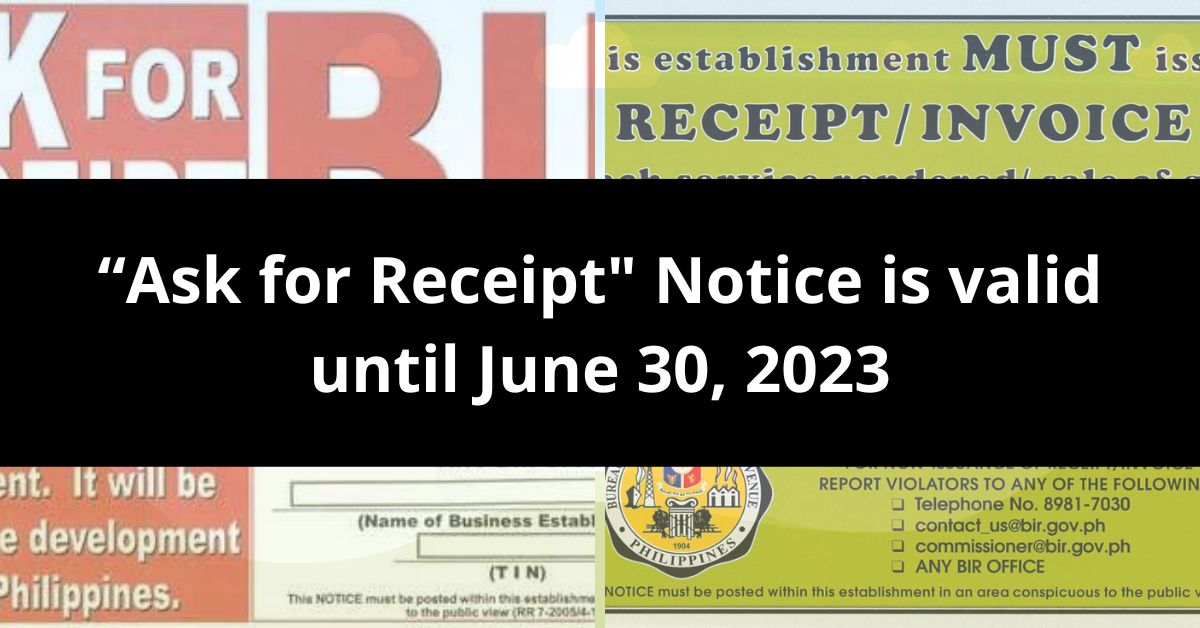“Ask for Receipt” Notice is valid until June 30, 2023
If you’ve ever noticed the vibrant orange “Ask for Receipt” signage displayed in establishments all over the country, you’ll be surprised to learn that it will soon undergo a transformation.
The “Ask for Receipt” campaign was launched by the BIR to encourage consumers to actively participate in combating tax evasion. By requesting official receipts, individuals could help ensure that businesses properly record their sales and pay the appropriate taxes.
This campaign played a vital role in creating awareness among consumers regarding the importance of tax compliance and the need for transparent business practices.
For years, the BIR’s “Ask for Receipt” campaign served as a reminder to consumers to request official receipts for their purchases. While it encouraged individuals to participate in curbing tax evasion, the effectiveness of this approach faced certain limitations.
Notice to Issue Receipt/ Invoice (NIRI)
To improve transparency and beef up its tax evasion campaign, the Bureau of Internal Revenue (BIR) has recently implemented a crucial change in its tax enforcement strategy.
BIR has issued Revenue Memorandum Order No. 43-2022, informing registered taxpayers that the current “Ask for Receipt” Notice is valid for display at their place of business including online business until June 30, 2023 only.
The existing signage will be replaced by the new BIR Notice through a staggered issuance based on the ending digit of their Taxpayer Identification Number (TIN).
Registered taxpayers should update their registration information and provide an official email address for communication purposes with BIR before they are given a copy of the new Notice to Issue Receipt or Invoice (NIRI BIR).
Moreover, new business owners, including online sellers and merchants, vloggers, social media influencers, and online content creators earning income from the platform and/or advertising are required to request the new BIR Notice, “Notice to Issue Receipt/Invoice” (NIRI) through their assigned Revenue District Offices after submission of the required documents.
Requirements in Requesting for the NIRI
- Accomplished two copies of the BIR Form S1905
- Bring the original old BIR Notice – “Ask for Receipt”.
If through an Authorized Representative
Individual Taxpayer
- Original copy of Special Power of Attorney (SPA);
- Copy of any government-issued ID of the taxpayer and authorized representative.
Non-individual taxpayer
- Original copy of Board Resolution or Secretary’s Certificate;
- Copy of any government-issued ID of the taxpayer and authorized representative.
Issuance of Official Receipt and/or Sales Invoice
Under Section 237 of the Tax Code, as amended, all persons subject to an internal revenue tax must issue duly registered receipts, sale, or commercial invoices prepared in a duplicate copy for every sale and transfer of merchandise or services rendered with transaction amount of one hundred pesos and up.
Additionally, online sellers and any person or entity engaged in selling or transacting business online are required to issue receipts and invoices pursuant to RMC No. 60-2020
Need BIR-related assistance?
We got you! Our dedicated team is here to support you every step of the way. If you have any questions or need assistance, don’t hesitate to reach out to us. You can easily get in touch by sending a message to info@djkaaccounting.com.
We understand the challenges that businesses face when it comes to navigating the intricate landscape of tax compliance. That’s why we’re here to alleviate your worries and take care of the complexities on your behalf.
At DJKA Business Services, Inc, we pride ourselves on providing exceptional service and personalized attention to our clients. Your success is our success, and we are committed to supporting you in achieving your business goals.
Related Posts
Recent Posts
- New Features and Functionalities of the Online Registration and Update System (ORUS)
- A Comprehensive Guide to Taxation for Freelancers in the Philippines
- New Tax Laws in 2024: What Changes Filipino Taxpayers Should Prepare For
- How to Avoid Common Tax Mistakes in 2024
- Tax Deductions and Benefits Often Overlooked by Filipino Taxpayers





